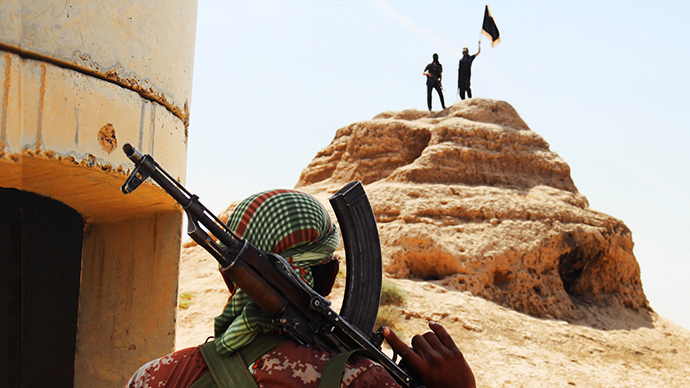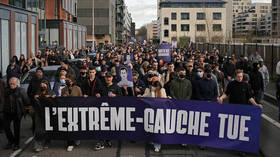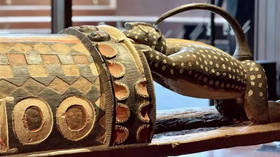Islamic State and the appeal of 72 Virgins-in-waiting: Video games, boredom and the lack of future prospects

Muslim extremism has been NATO's enemy-of-choice since the mid-1990's, and now this amorphous opponent has once again assumed the shape of a recognizable organization headed by a similarly tangible figure, worthy of a worldwide campaign of hatred.
Islamic State, the terrorist group formerly known as ISIS (or ISIL) has over the past weeks dominated much of the world's news coverage. Their brutal occupation of territories formally part of Syria and Iraq (thereby realizing the effective Balkanization of the Middle East) followed by their equally brutal persecution of, first, a Yazidi community forced to flee up a mountain near Sinjar and, now, the Shi'ite Turkmen town of Amerli (in fact, already under siege for the past 2 months), and particularly their recent internet-broadcast execution of American journalist James Foley have carved the group into the global audience's consciousness and beyond.
The new bogeyman
Abu Bakr al-Baghdadi, who likes to call himself "Caliph Ibrahim", as leader of the IS with apparently unlimited ambitions, has taken over the position vacated by bin Laden in the wee hours of 2 May 2011, when he was killed by twenty-three Navy SEALs from Team Six in the Pakistani town carrying the unlikely name of Abbottabad. Personalizing the enemy makes it easier to explain goals and objectives to the wider public.
US Defense Secretary Chuck Hagel did not hesitate to do just that some days ago (21 August 2014). Hagel literally said that Caliph Ibrahim and the IS constitute "an imminent threat to every interest we [the United States] have, whether it's in Iraq or anywhere else", then adding "Oh, this is beyond anything that we’ve seen. So we must prepare for everything.”
The Chairman of the US Joint Chiefs of Staff , General Martin Dempsey , also present at the briefing, went on to describe the IS as "an organization that has an apocalyptic, end-of-days strategic vision and which will eventually have to be defeated." Dempsey explained that this defeat has to be realized on “both sides of what is essentially at this point a non-existent border” of Syria and Iraq, referring to territories that are now, for all intents and purposes, the lands actually ruled by Caliph Ibrahim and subject to the idiosyncratic interpretation of Islam and the Shariah that make up the ideology of the Islamic State. And in this way, the West has now finally acquired its new bogeyman, able to attract and focus all kinds of intelligence and military attention.
In the face of this new threat, President Obama once again followed his predecessor's lead and started assembling his own "coalition of the willing,” starting a diplomatic campaign behind the scenes to enlist not just regional allies and neighbors, but a wider alliance comprising also Australia and Britain, in addition to such local players like Turkey, Jordan, Saudi Arabia, Qatar, and the United Arab Emirates.
Speaking at the veterans' organization the American Legion in Charlotte, N.C. on Tuesday (26 August), the President assured his audience that "[r]ooting out a cancer like ISIL [, still using the now familiar acronymization instead of the arguably somewhat more intimidating phrase Islamic State or simply IS] won’t be easy, and it won’t be quick,” in spite of the US’s awesome military might. In a rhetorical turn reminiscent of Bush, Jr. in the aftermath of 9/11, Obama vowed to “take the fight to these barbaric terrorists,” to faraway shores and fields at a more than safe distance from American soil, adding that the caliphal forces would be "no match" for a united international community under the banner of Obama's very own "coalition of the willing.”
Previously, President Obama had authorized air strikes aimed at IS positions in aid of the KRG's Peshmerga forces defensive military operations. In this context, it seems no coincidence that the name Kurdistan pops up in regular news casts nowadays in reference to northern Iraq's KRG – a tacit acknowledgement of US approval of Iraq's division into three separate units.
These US missiles, supporting the Iraqi Kurds in their bid to remain a sovereign entity, ostensibly led to the much-publicized beheading of Foley, the photojournalist who had travelled to Syria from Libya, where he had been kept by soldiers loyal to Muammar Gaddafi during a 44-day captivity in "a bunch of prisons" (2011), only to be captured by unidentified kidnappers in Syria nearly two years ago.
The unexpected suspect
James Foley's video-taped execution was released under the title A Message to America on 19 August. In the video, Foley appears to relay a previously scripted monologue on the culpability of US foreign policy prior to being beheaded by a veiled figure using an apparently rather blunt knife. This ghastly internet sensation caused global outrage, leading to his sister Kelly Foley to tweet "Don’t watch the video. Don’t share it. That’s not how life should be.”

The killer or executioner immediately became notorious for his own oration in a decidedly British accent: "Any attempt by you, Obama, to deny the Muslims their rights of living in safety under the Islamic caliphate will result in the bloodshed of your people." His identity was soon discovered, as four days later, British Ambassador to the US, Sir Peter Westmacott, told CNN that he "can't say more than this but I know from my colleagues at home that we are close," intimating the use of "sophisticated technologies, voice identification and so on" for the purpose of identifying and naming James Foley's alleged murderer.
It now turns out that the key suspect is an individual called Abdel-Majed Abdel Bary, a 23-year-old British former rapper (known also as L Jinny), who up-and-left his parental home in Maida Vale, West London in 2013 to join the jihad in Syria. To his mind the young man appeared to have had a good reason to join the fight, as "a well-placed source [in US intelligence] told Fox News that Bary's Egyptian-born father was extradited from London to the United States in 2012 for his alleged connection to Osama bin Laden and the 1998 US Embassy bombings in Africa.” So, Bary allegedly beheading Foley could be a personal act of retribution for the young rapper-turned-beheader. Using his blunt knife Abdel Bary interacted directly with three US Presidents – with Obama for having been in office at the time of his father's extradition (2012); with Bush, Jr. for having taken the fight to Osama bin Laden, and thereby implicating his father who was known to have been one of the latter's top lieutenants (2002); and with Bill Clinton for having been in charge during the bombings of US Embassies in Kenya and Tanzania and having subsequently identified Bin Laden as the main culprit (1998).
Media in the West have since been filled with numerous voices expressing utter consternation at the considerable number of European (as well as American) volunteers who have apparently joined the ranks of the IS – the BBC at the end of last year estimated their total troop numbers to consist of 3,000 to 5,000 fighters. Earlier this month, the lone man that is the Syrian Observatory for Human Rights reported that another 6,300 men-willing-to-fight had joined the Jihadi outfit in July.
While, just the other day, Colin Clarke, an associate political scientist at the Rand Corporation, came out claiming that that the total number of IS fighters is estimated to be about 10,000. Inside this main bulk of eager troops, the generally held consensus is that approximately 2,000 individuals hail from Europe, with a quarter of these young men.
Talking heads on television as well as the regular man and woman on the street seem perplexed and fail to understand why young men, born and bred in comfortable and arguably peaceful surroundings would abandon their easy lives to join a bloody fight in a remote location. Dr Joshua Landis, an Associate Professor at the University of Oklahoma, reasons that the appeal of the IS (which has a very tech-savvy social media propaganda apparatus at hand) is somewhat comparable to the allure the Spanish Civil War exerted on leftists of all stripe and color in the late thirties. While it does seem reasonable to assume that joining the Jihad in Syria and Iraq has considerable romantic appeal for disenfranchised Muslim youths living in Europe, it seems to me that the underlying reason for this current minor people's migration to the east should be looked for in the actual conditions faced by these apparently fervent individuals.
Nearly four years ago, I argued elsewhere that current generations of Muslim migrants' children and grandchildren daily face "prejudice and intolerance." Originally, these youngsters' parents and grandparents were met with blatant racism and xenophobia, facing discrimination "based upon their status as foreigners, foreigners from the backward East, speaking a different language and practicing a different religion.”
Nowadays in this post-9/11 world we live in, the vocabulary has changed yet the sentiments have remained the same. As, "commentators and politicians alike tend to forget national or ethnic identifiers, instead opting for religious markers, and thus speaking about the Muslims other present in ... Europe ... the Muslim other whose presence and actions are incompatible with Western civilization and alien to the Judeo-Christian tradition which provides the framework for much, if not all, of Europe’s culture and identity.”
The professor of sociology, scholar and expert in Islamic matters, Stefano Allievi rightly remarks that the “immigrant ... has progressively become ‘Muslim,’ both in his/her perception by the host societies and in his/her self-perception.” And as a result, Europeans nowadays express their dislike of the “other” in religious and/or cultural terms, leading to the "creation of a new term that is oftentimes not even associated with racist sentiments and/or reflexes: Islamophobia. But we should be clear about this: Islamophobia is nothing but a new name given to the age-old reflex of racism.”
Children of Muslim parentage living in Western Europe as thus faced with Islamophobia or xenophobic racism on a daily basis; a circumstance which arguably leads to less than successful educational careers (oftentimes steered towards vocational or technical training), in turn followed by bleak job prospects and a culture of dependency (on either family or state-provided assistance).
Coupled to this less than rosy outlook is the fact that these young men more often than not succumb to sheer and utter boredom, arguably relieving their tedium with bouts of playing violent video games offering a temporary escape while boosting crumbled egos. Societal pressure thus pushes these youngsters in the direction of Islam and, given parental and family background, these young men frequently embark on a journey of self-discovery leading them to recognizing Jihad as their true cause making their empty lives full and meaningful. But, the dead weight of the boredom faced by these young men does not always lead to a journey of religious self-discovery, as attested by the recent revelation that the originally Birmingham-based and now terror-convicted Jihadi fighters Mohammed Nahin Ahmed and Yusuf Zubair Sarwar actually purchased such books as Islam For Dummies, The Koran For Dummies and Arabic For Dummies from Amazon prior to flying to the Middle East.
In the end, the US and its allies have now found their new bogeyman, sticking close to the recommendations made by then-NATO Secretary General Willy Claes, who, in 1995, envisaged that "Islamic militancy has [now] emerged as perhaps the single gravest threat to the NATO alliance and to Western security.” And this threat has taken the shape of two individuals between 1998 and 2014 – from Osama bin Laden to Abu Bakr al-Baghdadi, aka the Caliph Ibrahim, now even aided by numerous bored youths fleeing Islamophobia and a bleak life in Europe, possibly but not necessarily chasing 72 virgins in the afterlife.
The statements, views and opinions expressed in this column are solely those of the author and do not necessarily represent those of RT.
The statements, views and opinions expressed in this column are solely those of the author and do not necessarily represent those of RT.













